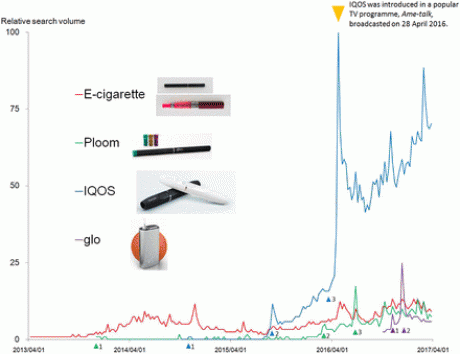February 3, 2018
Kelly Young-Wolff and colleagues’ new paper, “Documentation of e-cigarette use and associations with smoking from 2012 to 2015 in an integrated healthcare delivery system” provides further insight into the dynamic relationship between e-cigarette and cigarette use. They collected information on e-cigarette and cigarette use for 7926 people aged 12 and older enrolled in the Kaiser Permanente HMO in Northern California in 2014 and compared that behavior to what products they were using a year later. They found three distinct linked behaviors:
- Cigarette smokers who used e-cigarettes at baseline were less likely to be smoking cigarettes a year later, i.e., e-cigarettes were helping people quit cigarettes
BUT
January 30, 2018
It is an article of faith at the FDA and among e-cigarette enthusiasts that nicotine is not carcinogenic and that e-cigarettes do not pose any substantial cancer risk because the levels of carcinogens in e-cigarette aerosol is much lower than in a conventional cigarette.
These beliefs are challenged by a recent paper, “E-cigarette smoke damages DNA and reduces repair
activity in mouse lung, heart, and bladder as well as in human lung and bladder cells,” by Hyun-Wook Lee and colleagues at NYU. They exposed live mice to light levels of e-cigarette aerosol and found damage to the DNA in lung, heart and bladder cells as well as in human lung and bladder cells. They found that the cells themselves converted nicotine to carcinogenic NNN and NNK even if it was not in the original e-cigarette aerosol. They also found that exposure to nicotine and e-cigarette aerosol damaged normal DNA repair mechanisms.
Here is how they sum up the significance of their findings:
January 29, 2018
 Philip Morris International is promoting IQOS, its new “heat not burn” tobacco product, all over the world, including in Japan, as a healthier alternative to cigarettes.
Philip Morris International is promoting IQOS, its new “heat not burn” tobacco product, all over the world, including in Japan, as a healthier alternative to cigarettes.
A 2017 scientific paper tracked four years of Google searches for IQOS and other new tobacco products, including e-cigarettes and heat-not-burn products from other tobacco companies.
When the popular Japanese variety show "Ame Talk" featured IQOS, Google searches for IQOs skyrocketed and stayed much higher than competing products.
This is just the latest example of the power of entertainment media to push tobacco products.
January 27, 2018
Philip Morris claims that they only market IQOS to current smokers for “harm reduction” (ignoring the fact that their own evidence shows no reduction in harm in people who use them), but new data from Italy belies that claim.
In a new paper in Tobacco Control, ”Heat-not-burn tobacco products: concerns from the Italian experience,” Xiaoqiu Liu and colleagues find that nearly half (45%) of IQOS users are never cigarette smokers and over half (51%) of people who are interested in IQOS are never smokers.
While this is bad news for public health, it is great news for Philip Morris.
Regulators around the world should take note.-
The full cite for the paper is Liu X, Lugo A, Spizzichino L, et al. Heat-not-burn tobacco products: concerns from the Italian experience. Tobacco Control Published Online First: 26 January 2018. doi: 10.1136/tobaccocontrol-2017-054054 and it is available here.
January 27, 2018
I have been very concerned about the emerging for-profit marijuana industry turning into the new tobacco industry (reference 1, reference 2), with all the accompanying health problems that increase marijuana use will bring. At the same time, there are some medical benefits from marijuana and Melvin Livingston and colleagues recently published an interesting paper in American Journal of Public Health that showed that the rising trend of opioid-related deaths in Colorado reversed following legalization of recreational cannabis.
Their well-done paper, “Recreational Cannabis Legalization and Opioid-Related Death in Colorado, 2000-2015,” examined the trend in deaths for 4 years before and 2 years after recreational cannabis was legalized. As shown in the attached figure (from their paper) the rising trend in opioid deaths reversed.
